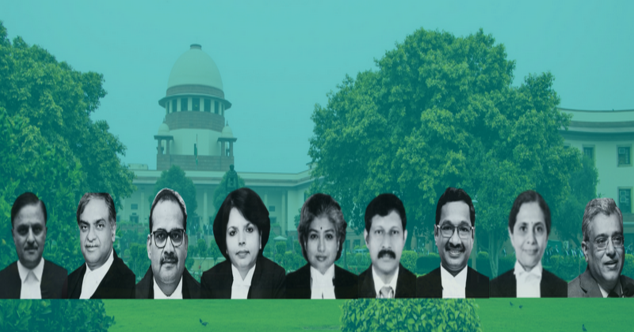Analysis
Monthly Review: August 2021
In August nine judges were appointed to the Supreme Court. Hearings also began in the Pegasus case. Justices Nariman and Sinha retired.

The Supreme Court (SC) in August saw significant developments, most of which pertained to the appointment and retirement of judges. Nine new judges were appointed, including three women. All nine were sworn in on the 31st. The Court also began hearing the Pegasus Spyware case, along with one hearing on children in protection homes. As the number of COVID cases has been decreasing, the CJI expressed his plan to open the court for physical hearings. However, for now, a hybrid system is being followed, with a combination of virtual and limited physical hearings.
Tracked: Pegasus Spyware Probe
The Court began hearings on the Pegasus Spyware. The Court will decide whether a judicial probe must be conducted to investigate the Indian Government’s alleged use of the Spyware.
In July 2021, an international association consisting of 17 media organisations and Amnesty international published a list of 50,000 phone numbers that were potential targets of Pegasus. This list included Indian journalists, politicians and judges of the Supreme Court.
Multiple petitions were filed by the persons targeted by the spyware. The Supreme Court began hearing the matter on August 16th. We are tracking the case. Reports of each hearing are also available.
Research: TN’s Revival of Old Land Acquisition Laws Upheld; Parliament Restores States’ Powers to Identify OBCs
In 2013, the Parliament had passed a new Land Acquisition law with progressive requirements such as obtaining consent from landowners. Tamil Nadu sought to side-step the Union law by ‘exempting’ three of their older land acquisition laws. However, the Madras High Court struck these down in 2019. Two weeks later, Tamil Nadu passed another legislation, ‘reviving’ the three old laws with retrospective effect. This time, the Supreme Court upheld the effort to side-step the 2013 law. In our post, we look at the Court’s reasoning and how this paves the way for other States who were also hoping to side-step the law.
On August 19th, the 105th Amendment was passed, which clarified that States have the power to identify Socially and Educationally Backward Classes (SEBCs), commonly known as OBCs. This effectively overturned the judgment in the Maratha Reservation case, where the Supreme Court held that the 102nd Amendment did not recognise the states’ power to identify OBCs: only the Union had that power. In our post, we emphasise that the cause of conflict was the interpretation of the 102nd Amendment, and discuss the ‘overturning’ of this judgment by Parliament.
Nine Judges Join the Court; Representation of Women at an All-Time High
On August 17th, the collegium recommended nine judges to be appointed to the SC and on August 26th, the President approved all nine recommendations. The appointments include four chief justices, four high court judges, and one senior advocate.
We reviewed the composition of the SC in light of these new appointments, and traced the effect on diversity in the Supreme Court. We looked at the religious, regional and gender diversity among the 33 sitting judges.
With the new appointment, there are now four woman judges in the Supreme Court. We examined the issues of prioritising merit and seniority for appointments, and the possibility of gender as a criteria going forward.
In our post, we briefly looked at the profiles of the appointed judges. We also put up more detailed profiles of the nine judges here.
The nine recommendations came in time as two judges retired, leaving the Court with 10 vacancies. With these appointments, there is only one vacancy.
Justices Nariman and Sinha Retire
Justice Rohinton Nariman retired on August 12th. In our post we look at his key judgments on civil liberties, reservations, criminal law and more. We also looked at his tenure in numbers. He wrote the second-highest number of judgments on the Bench at 307 judgments.
A few days later on August 18th, Justice Navin Sinha retired. He wrote 33% (44 out of 126) of his judgments on criminal law. These were also his most significant judgments. He also heard important cases dealing with the legal profession and the judiciary.
With the Court’s increased strength and the beginning of physical hearings, we suspect that September could see developments in tackling pendency and hearing of important cases. Important hearings will be tracked here, and court developments will be tracked here.